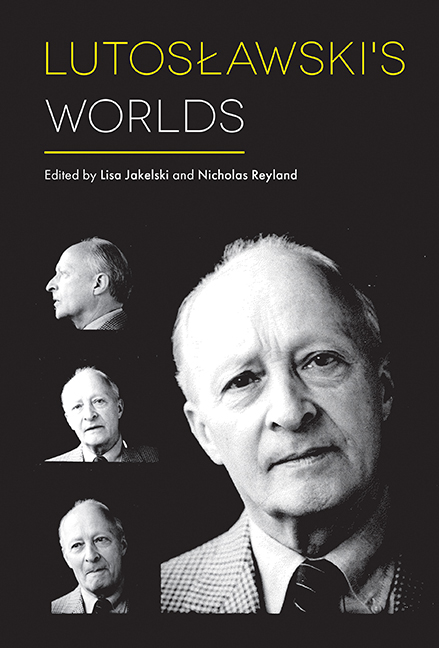Book contents
- Frontmatter
- Dedication
- Contents
- List of Figures
- List of Tables
- List of Music Examples
- List of Contributors
- Acknowledgements
- Introduction
- PART I mourning, modernism, and genius
- 1 Witold Lutoslawski's Muzyka zalobna (1958) and the Construction of Genius
- 2 Personal Loss, Cultural Grief, and Lutoslawski's Music of Mourning
- 3 Lutoslawski's String Quartet: Mourning, Melancholia, and Modern Subjectivity
- PART II other lutoslawskis
- PART III documents
- PART IV political engagement
- PART V legacies
- Bibliography
- Index
3 - Lutoslawski's String Quartet: Mourning, Melancholia, and Modern Subjectivity
from PART I - mourning, modernism, and genius
Published online by Cambridge University Press: 14 June 2019
- Frontmatter
- Dedication
- Contents
- List of Figures
- List of Tables
- List of Music Examples
- List of Contributors
- Acknowledgements
- Introduction
- PART I mourning, modernism, and genius
- 1 Witold Lutoslawski's Muzyka zalobna (1958) and the Construction of Genius
- 2 Personal Loss, Cultural Grief, and Lutoslawski's Music of Mourning
- 3 Lutoslawski's String Quartet: Mourning, Melancholia, and Modern Subjectivity
- PART II other lutoslawskis
- PART III documents
- PART IV political engagement
- PART V legacies
- Bibliography
- Index
Summary
The Poet Speaks
Whenever Lutosławski speaks about his music, he exhibits a Freudian ambivalence of the variety that expresses one idea while being at pains to hide a conflicting one. As Freud explains, an ambivalent attitude involves the desire to perform an act that the subject considers consciously to be taboo while feels unconsciously to be enjoyable. In Lutosławski's case, he refuses to acknowledge any extra-musical content to his music, as if to do so would break the taboo of the absolute. Yet, his words about music belie an unconscious acknowledgement of its power of expression, drama and even narrative. As I have discussed elsewhere, this ambivalence is particularly evident in Tadeusz Kaczyński's published conversations with Lutosławski, especially in an outburst of dismay concerning Kaczyński's interpretation of the Cello Concerto.
I'm horrified to see how one can be carried away by my careless mention of the dramatic conflict between the solo part and the orchestra. I must immediately use the reins on this galloping imagination which prompts you to interpret the work as an illustration to some macabre spectacle.
Later in the same interview, Lutosławski maintains that he views ‘any discourse about the so-called content of a composition with some scepticism’, because to him ‘this content is absent’. Still, in an interview with Irina Nikolska, Lutosławski admits that the term ‘form’ is inadequate to describe his music because it lacks the ‘dramatic and literary implications’ that the Polish word akcja (action) or the English word ‘dramaturgy’ include. While at pains in his interview with Kaczyński to deny music's content, Lutosławski nevertheless lets slip that there are dramatic and literary implications in his music during his interview with Nikolska.
This ambivalence about music's content is also manifest in Kaczyński's interview with Lutosławski concerning the String Quartet of 1964. The composer affirms that his quartet had special significance in his oeuvre, although his reasoning relates to the impossibly fraught concept of the purely musical. Lutosławski mentions the two-movement form (‘the first one less important than the second’), the episodic opening, and the ‘advanced aleatory’, among other technical features, as important practices that he developed again in the Second Symphony and the Cello Concerto.
- Type
- Chapter
- Information
- Lutoslawski's Worlds , pp. 71 - 86Publisher: Boydell & BrewerPrint publication year: 2018



